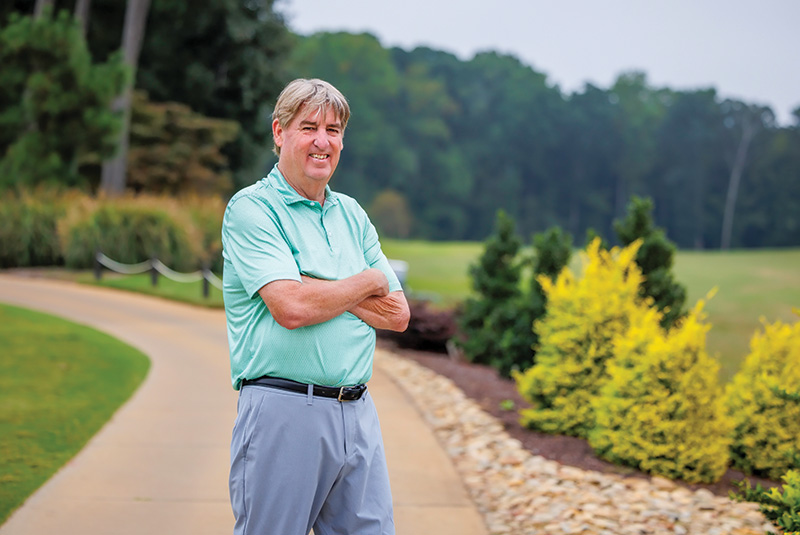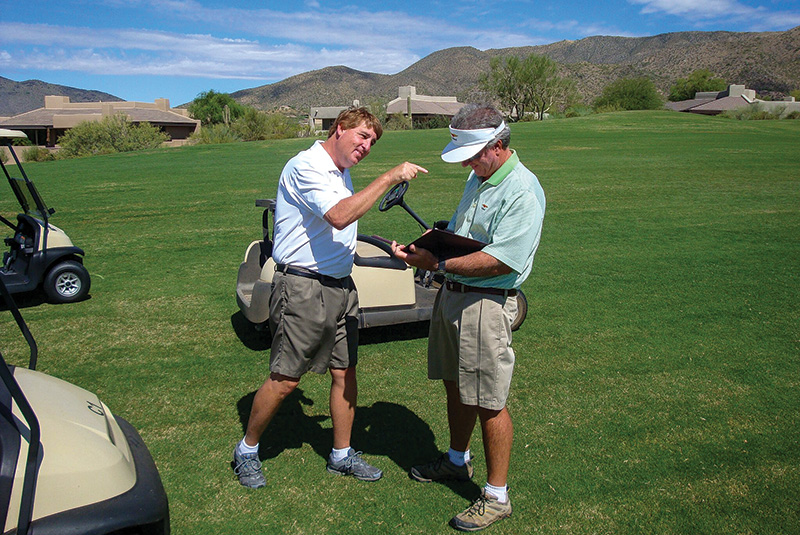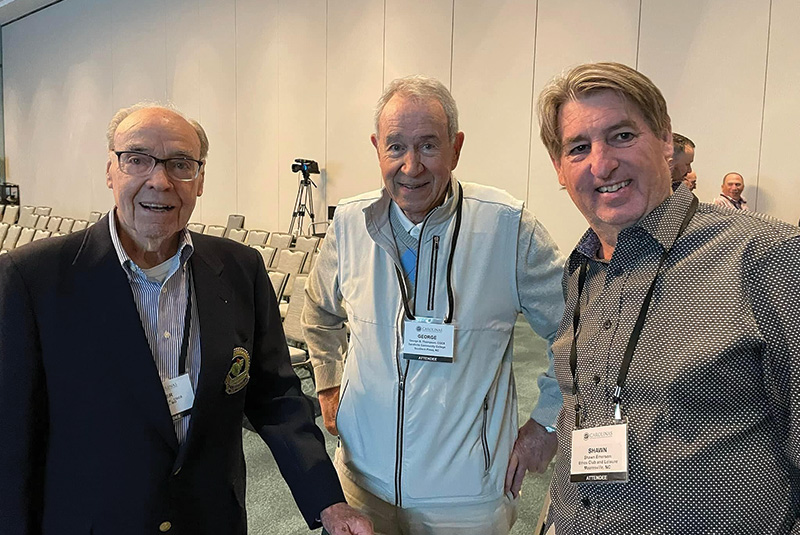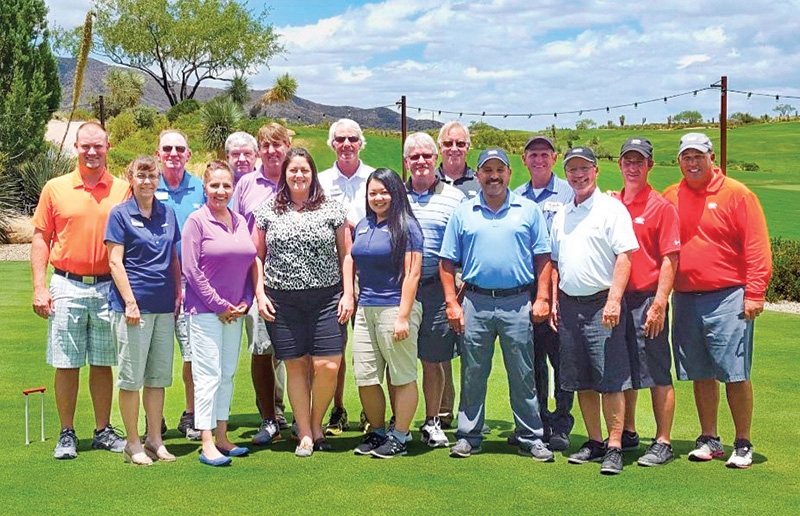
Shawn Emerson has a 40-year career in turf that began when his father Bill, also a superintendent, brought him along to work at Crofton Country Club in Crofton, Md. Photo by Kathleen Martin
The Shawn Emerson story brings its own meaning of getting in on the ground floor.
The son of a heralded superintendent, Emerson was 9 years old when he showed up that day at Crofton Country Club in Crofton, Md., eager to introduce himself to this industry. His father, Bill, whom legendary golf course architect Geoffrey Cornish called a pioneer for his efforts in restoration and renovation, handed his son a broom, even though the kid was more comfortable on the baseball diamond. Still, the boy got after it, determined to impress.
“He told me to sweep the floor of the shop,” Shawn Emerson says. “I found out later it was a dirt floor. They all laughed at me.”
Shawn Emerson literally did start from the ground floor — but his rise was no joke. Not when you switch from a life in baseball and amass more than 40 years in your career and receive Hall of Fame honors. And not when you spend decades at one of the most prominent facilities in the region at Desert Mountain Golf Club in Scottsdale, Ariz., overseeing more than a handful of courses. Certainly not when you led roughly 50 people who achieved superintendent status and 75 more who were assistants throughout the country, coast to coast, and even an island, where Kenton Brunson, CGCS, still views Emerson in high esteem no matter how far apart they are.
“I would not be where I am today without Shawn,” says Brunson, an eight-year GCSAA member and director of agronomy at The Mid Ocean Club in Bermuda. “He pushed me to be my best 24/7, and his message was always consistent. He expected perfection on his golf courses. The reason he lasted so long was that he cared so much.”
Says GCSAA Class A superintendent Charlie Costello, a 29-year association member at Burning Tree Club in Bethesda, Md., “He has a real knack for bringing people together. I think he was ahead of his time. He gave us a lot of leeway, which developed a synergy.”
Another branch of the Emerson tree is 26-year GCSAA association member David Dudones, GCSAA Class A director of agronomy at Westchester Country Club in Rye, N.Y., who spent time as an assistant for Emerson in Arizona. “I joked around with him that you have superintendents all over the country that worked for you. I told him we should all get together and play,” Dudones says, “but I also told him we might need two courses for that.”
Nowadays, as associate principal for agronomic services with Ethos Club & Leisure that is based in Dallas, Emerson continues to lend his experience to support and grow golf operations. Judging by his industry longevity, the résumé and the results, Emerson has the credentials to guide others to greater heights. “I’ve always looked at it as more of a career than a job,” Emerson says, “and I am in the business of agronomy.”

Emerson (left) shares his thoughts with Tim Moraghan, who for over 20 years was director of championship agronomy at the USGA. Photos courtesy of Shawn Emerson
From America’s pastime to time for a change
To say that baseball runs in the Emerson family is an understatement.
Growing up in Maryland, he was a diehard Baltimore Orioles fan. Emerson excelled as a right-handed pitcher, throwing first for Montgomery (Md.) College. In a doubleheader against Frederick (Md.) Community College, he pitched both games and defeated the No. 1-ranked foe twice. He lacked an arm like Nolan Ryan, but what he delivered worked. “I didn’t throw very hard. I got pop-ups, flyouts. I threw strikes,” says Emerson, who went on to play baseball and golf at American University in Washington, D.C.
His son, Jacob, wrapped up his collegiate pitching career and now is the pitching coach and recruiting coordinator at Concord University in Athens, W.Va. Currently, the Emerson name continues to maintain the baseball legacy at the highest level of the game — Shawn’s brother Scott serves as pitching coach for the Oakland Athletics.
“Whether it’s been baseball or on the golf course, he is competitive. If you do it, do it right,” Scott says. “When I drove around the golf course with him, he had a good eye. We came to a stop, and he cut some grass with a little pair of scissors. His desire for perfection makes him who he is.”
Shawn Emerson stuck with baseball until he couldn’t. He coached summer league teams and did some scouting for the Orioles, but it came at a price. “At age 22, 23, I had to make a decision. Baseball scouting didn’t pay enough,” he says.
A change of scenery altered Emerson’s future. Not too long after the family moved to Arizona in 1983, Emerson chose to make a mark in a profession that runs through his veins. He enrolled at the University of Arizona and earned a degree in agronomy and crop science. A year after graduation, Emerson was hired at Desert Mountain. A year after that, he was named superintendent at the Renegade Course, the first of the six Jack Nicklaus Signature Courses there. During his journey, Emerson paid close attention to those who taught him, such as his father, as well as Virgil Robinson at PGA West in La Quinta, Calif. George Thompson at Columbia Country Club in Chevy Chase, Md. Fred Yelverton, Ph.D., at North Carolina State University.
Then there’s Leah Brilman, Ph.D., director of product management and technologies for Oregon-based DLF-Pickseed. She and Emerson worked together at Desert Mountain on overseeding and bentgrass trials, including 007 Mackenzie bentgrass, which she says he helped her refine. Brilman says, “He led the charge on a lot of things, I think. He’s been moderator for our early-morning discussions with superintendents at the GCSAA Conference and Trade Show, where we share opinions on turfgrasses and, ‘How do we have less environmental impact?’
“What you find is, he’s very good at working with others, training them to make their own decisions. He was good at mentoring at a time when nobody asked what mentoring was. He treated me as good or better than anybody else. You look back and recognize how unique some people are. Can you kind of tell I’m a Shawn fan?”
Emerson calls out Brilman and others in his life for setting standards he recognized. “I learned from the best,” Emerson says. “I called them godfathers and wizards — the best professionals I could find, who did it and were successful.”

Emerson (right) with industry legends Palmer Maples (left) and George Thompson.
Taking the heat, taking the lead
Neither scorching temperatures nor time discouraged Emerson. Curtis Tyrrell, CGCS, MG, marveled at it.
“Picture yourself, middle of the summer, and it’s really hot. Everyone wants to get out of there because it’s crazy hot. Here was Shawn, hanging out, and we drove around and talked turf, coming up with ideas and talking strategy,” says Tyrrell, talking about those days at PGA West. He’s currently a 28-year GCSAA member and director of agronomy at Desert Highlands Golf Club in Scottsdale. “It was just a pure expression of his passion and commitment to his work. He was always working hard to improve.”
Emerson estimates he overseeded at least 70 courses and transitioned them back to bermudagrass. Working with legends such as James Beard, Ph.D., Emerson reduced water usage in the desert by as much as 15%, a critical factor out West. Past GCSAA Col. John Morley Distinguished Service Award winner Cal Roth oversaw a younger Emerson at TPC Scottsdale. Emerson reminded Roth of Emerson’s father, which was a good thing. “Shawn reached out to others in the business to further his career,” says Roth, former senior vice president of agronomy at the PGA Tour. “That’s a sign of a good leader, challenging himself and also the industry, to get better.”
Emerson got better by listening, learning and implementing a mountain of information throughout his career at Desert Mountain, where he worked from 1991 to 1994, returned in 1996 and hosted PGA Tour Champions majors after stops at Coronado Country Club in El Paso, Texas, and PGA West before leading the Arizona facility into 2021.
He gladly shares his thoughts on what helped make it possible. It began when he shadowed his father, who was inducted into the Arizona Golf Hall of Fame in 2012, five years before his son.
“When my father became a superintendent in 1963, he was a friend of Angelo Cammarata (CGCS). They called him Angie,” Shawn says. “I saw a camaraderie among superintendents. That’s how I learned this was a group effort in their business. They shared things, did things to help each other. Dad always told me it’s about people, that we always can grow grass. It’s about the people.”
His father also told him, “If you think you’re the smartest man in the room, you made a mistake.” At Desert Mountain, Emerson oversaw up to 200 employees. It was a learning process to handle operations of that magnitude. Importantly, he wanted them to be themselves. “Help them develop their own path to success, not mine. I wanted everyone to develop their own style,” he says.
As a leader, Emerson counted on them. “You need people around you to get work done. You cannot do this alone,” says the 34-year GCSAA member. “Build a team. Embrace them. I needed to make them better if I wanted to be successful.”
It didn’t take long for Matt Travitz to be a success. He went from being a spray tech to a superintendent in 21⁄2 years at age 24 under Emerson at Desert Mountain. “He held us accountable for doing things right, and I worked my butt off to make sure I succeeded,” says Travitz, owner of ADW Turf Sprayers in Phoenix.

Emerson and team members and staff with the Outlaw course in the background at Desert Mountain.
This is what Emerson wanted all along.
“I hope people working for me became better fathers, better husbands. I didn’t want them to make the same mistake I did by working too much,” says Emerson. “That doesn’t mean 50/50, but have enough time for family and a career.”
The present and the future
In his current career move that began three years ago, Emerson travels about four days weekly. He also is on the move to see his children — son Jacob and daughter Rebecca, who’s working on her master’s degree at the University of Alabama. It also gives him a chance to spend more time in transit with his wife, Laura. “It’s her strategy to get me out of the house, take a few breaks and see the kids,” he says.
Emerson won’t slow down, however, in enhancing the industry he cherishes. Even if it started with only a broom. “Keep advancing in this industry. What you did five years ago may not be the way to do it today,” Emerson, 61, says. “And remember the best presentation you can make is your golf course.”
Howard Richman (hrichman@gcsaa.org) is GCM’s associate editor.